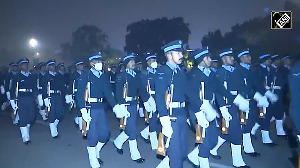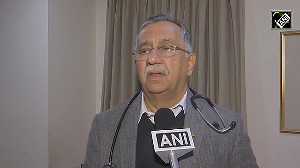Pakistani-American terrorist David Headley's plea bargain, under which he confessed to plotting the Mumbai terror attacks, throws light on close links between the Al Qaeda and the Lashkar-e-Tayiba, according to former Central Intelligence Agency expert Bruce Riedel.
Headley's story showed in clear contours the close relationship between Al Qaeda and the Pakistani militant group LeT, Riedel, who led the review of the Obama administration's Af-Pak strategy, was quoted as saying by The New York Times.
Revelations in Headley's plea agreement around Al Qaeda's European cell were particularly disturbing, said Riedel, who was also a member of the National Security Council in the Clinton administration and is now at the Brookings Institution.
They showed that "Al Qaeda still has a significant operational infrastructure somewhere in Europe," he said.
The paper said the plea agreement released last week showed that Headley moved effortlessly between the US, Pakistan and India for nearly seven years, training at a militant camp in Pakistan on five occasions.
Headley's travels included several cities in India, meeting with a senior operative of the Al Qaeda in Pakistan's tribal belt and two trips to North Waziristan region, it said.
"These and other new details of Mr Headley's activities, contained in the plea agreement, raise troubling questions about how an American citizen could travel for so long undetected from his home base in Chicago to well-established terrorist training camps in Pakistan," the Times said.
In Pakistan, Headley planned the Mumbai terror attacks and got in touch with an Al Qaeda cell in Europe that may still be operative, the report said.
"The (plea agreement) document shows the cell was well supplied with weapons and money and primed for an attack until the moment Mr Headley was arrested by the Federal Bureau of Investigation at the O'Hare airport last October," the daily wrote.
As Headley became 'more intensely involved in the web of militant activities in Pakistan -- sometimes training for months at a time -- and then making five trips to Mumbai from
2006 to 2008 to scout locations," he kept his base in Chicago, it said.
In his plea, Headley said that the LeT remained active behind the veil of a public charity, an apparent reference to Jamat-ud-Dawa, and continued to be aided by ex-Pakistani military officials.
The plea agreement showed that a retired Pakistani military officer, Colonel Abdur Rehman Hashim Syed, known as Pasha, was Headley's main contact with the LeT. In early 2009, Syed introduced Headley to Muhammad Ilyas Kashmiri, an Al Qaeda operative in North Waziristan and then Syed served as a go-between, the paper reported.






 © 2025 Rediff.com -
© 2025 Rediff.com -